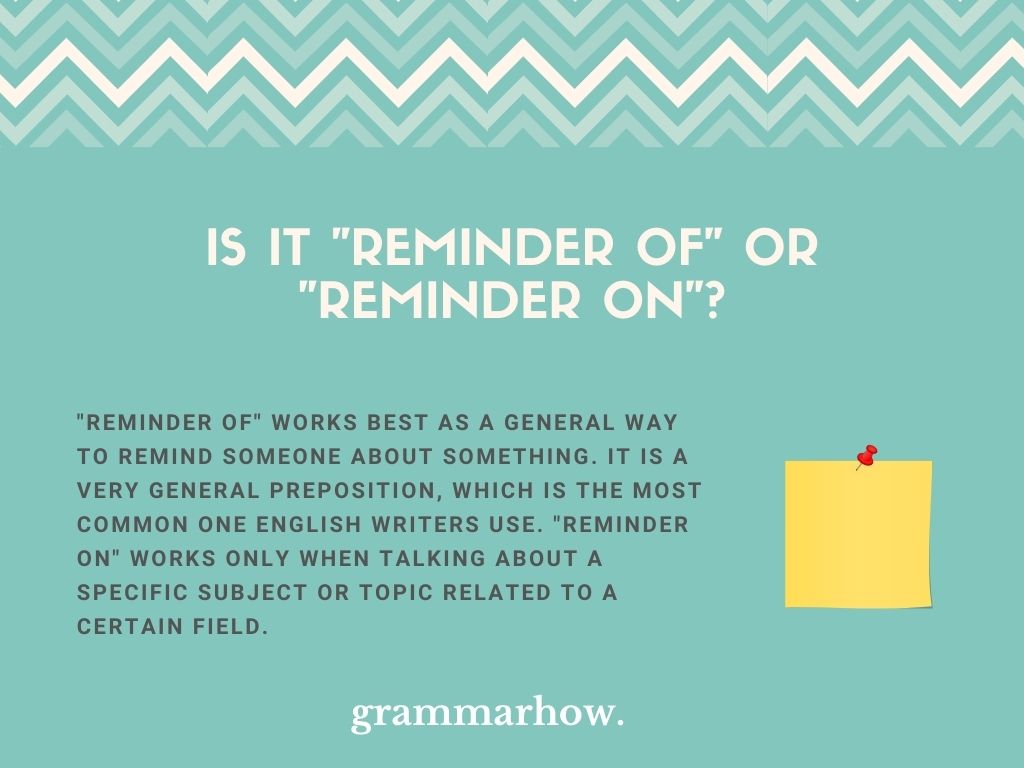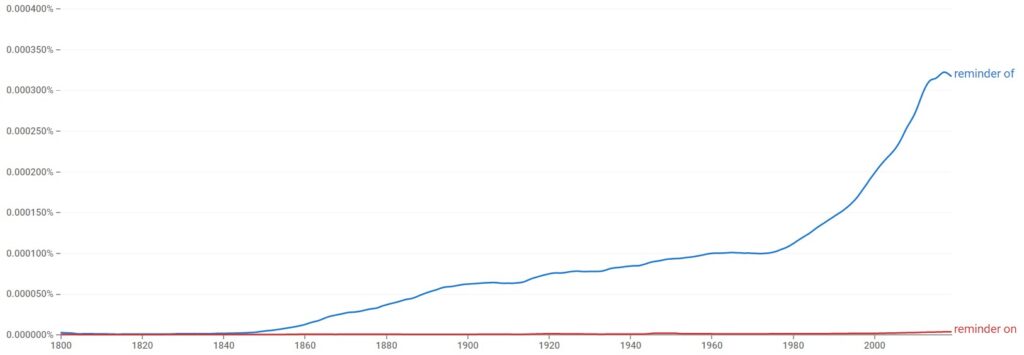Prepositions can be difficult to figure out. It can seem like different prepositions have different rules depending on which word you use them with. This article will explore how to use “reminder of” and “reminder on” correctly.
Is It “Reminder Of” Or “Reminder On”?
“Reminder of” works best as a general way to remind someone about something. It is a very general preposition, which is the most common one English writers use. “Reminder on” works only when talking about a specific subject or topic related to a certain field.

If you don’t quite understand what we mean, you can refer to the following examples:
- A reminder of this document is required.
- A reminder on this document is required.
“Reminder of” shows that someone is expecting to be reminded of something related to the document. This could be a general reminder that might indicate that the document needs to be written or completed.
“Reminder on” shows that the document needs to have a reminder inserted into it. This is usually for the next reader to be reminded of something rather than the current reader needing any sort of reminder (since they’re writing the document).
When Should I Use “Reminder Of”?
It might help if we went through the two prepositions a little closer. If you haven’t already guessed, “reminder of” is the more common one, so it would make more sense to go over it first.
“Reminder of” is best when we are generally creating a reminder for someone. It allows us to be nonspecific with the reminder, and it might just let them know that something is expected that might have been forgotten about.
Perhaps you’d benefit from checking these examples out for it:
- Have you provided him with a reminder of our anniversary yet?
- I have a reminder of this on my phone, and I’ll be sure to check back on it when I need to.
- I haven’t had a reminder of what’s going on, but I’m sure I’ll find one soon.
- I need a reminder of this situation because no one has clued me in!
- The reminder of this event was unnecessary. Now everyone is sad again, and it’s all his fault.
- You should have been given a reminder of this problem. It would not be my fault if you didn’t pay attention to it.
- A reminder of the things he did was needed to bring him back down to earth.
When Should I Use “Reminder On”?
It’s more specific, so it would help to know how “reminder on” works in a slightly different way.
“Reminder on” is a specific prepositional phrase we use when there is something to note about a topic. It’s much less common to use “on” over “of,” but we can use it when someone wants to draw attention to something.
Here are a few examples to help you:
- I’ll need a reminder on what’s going on. Do you think you can provide me with one?
- The reminder on the math topic wasn’t much help, and I’m still stumped by it.
- I think a reminder on all of the issues in this project will help us to build team cohesion.
- The reminder on the wall wasn’t clear enough, and everyone walked past it anyway.
- I received a reminder on an email about this, but I don’t know why I was the only one to get it.
- The reminder on the topics wasn’t much good to me! I think I’ll just Google the problems.
- Can you provide him with a reminder on this, please?
How Prevalent Is The Usage Of “Reminder Of” And “Reminder On”?
It would probably help to take a second to look at the popularity of the two phrases. We can refer to Google Ngram Viewer when we want to learn more about prepositional rules and popularity.
According to Google Ngram Viewer, “reminder of” is by far the most popular choice of the two. As you can see from the clear differences in the graph, it’s much more likely that we’ll come across a “reminder of.”

In fact, if we only had these results to go off of, it would make it seem like “reminder on” isn’t correct. However, it does work; it’s just nowhere near as popular as “reminder of,” which is why it looks so different on this graph.
As we’ve stated, “reminder of” is just the more general option, which is the one people often choose. “Reminder on” has a few too many specifics related to it, so it doesn’t apply to as many situations.
Which Other Prepositions Can Be Used After “Reminder”?
There are a few other options available to us that it’s worth talking about. “On” and “of” aren’t the only acceptable prepositions.
“Reminder” can be paired with the prepositions “about,” “for,” and “to.” We can use each one to give certain reminders about things, and they vary in popularity based on what they are trying to achieve for the reader.
Reminder About
“Reminder about” is the most similar to “reminder on.” We use it when we want to pose a specific reminder toward a person that relates to a subject.
- I was given a reminder about this topic, and now I have a better understanding of it.
- The reminder about the issues was necessary because I’d forgotten about the bad ones.
- I don’t think your reminder about this was needed.
Reminder For
“Reminder for” works well when we know that something is coming up. It usually refers to an event, and we provide a “reminder” to somebody who might have otherwise forgotten about it.
- He gave me a reminder for the party, which is exactly what I needed.
- You should have given him a reminder for this one because he definitely forgot about it.
- The reminder for the event should have gone out by now! Where is everyone?
Reminder To
“Reminder to” works when we want to remind someone to complete a specific action. It’s common for a verb to follow “to” here that we want people to do for us.
- I gave him a reminder to brush his teeth, but I don’t think he’s learned yet.
- The reminder to get this finished in time was exactly what I needed from my boss.
- She wanted to say that it’s a reminder to complete the work. We should do it before we leave!
